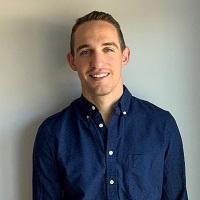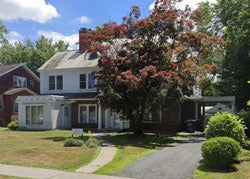
Brief Bio: Mike is from Albany originally, and went to South Colonie Central High School. He started his undergrad at the University of Miami (NOT the one in Ohio), but transferred to RPI in the Fall of 2015 to finish his B.S. in Aeronautical Engineering. He currently works in the Center for Mobility with Vertical Lift (MOVE) under Prof. Farhan Gandhi, which is a group focusing on many different areas in vertical flight technology. Specifically, his research involves flight mechanics modeling and control design for advanced VTOL platforms, with an emphasis on fault tolerant control design. He was awarded the National Defense Science and Engineering Graduate (NDSEG) Fellowship in May of 2017 (award began in August 2017) During the past 4.5 years of graduate school and almost 4 years on the fellowship he has been awarded a Vertical Flight Foundation Scholarship twice, been runner up in the VFS Lichten speaking competition, won a best paper award for the AIAA/IEEE Electric Aircraft Technology Symposium in 2018, and finished in 3rd place (along with his entire team) for the VFS graduate student design competition in 2019.
What have been some of the benefits of your fellowship experience; what have you enjoyed the most?
The NDSEG fellowship is a DoD sponsored fellowship, so my work is funded through the Army Research Office. This means that the work I do is directly relevant to the Army and the DoD at large, and has helped me to form and maintain relationships with different experts within the Army and get help and opinions with my work. A great benefit of this award in particular is the lack of a commitment after the fellowship concludes, whereas something like the SMART fellowship requires a certain amount of service after the degree is completed. The single most enjoyable experience I’ve had directly from this fellowship was a fellows conference in 2019, where NDSEG hosted all of the 2017 cohort and I was able to meet and interact with other PhD students in many different areas. This experience seems to have been specific to my cohort, but NDSEG typically provides some level of travel stipend for conferences and professional experiences, so this is particularly useful (and enjoyable) as well.
What has been the most challenging aspect of the fellowship experience?
This is an interesting question, because the fellowship award tends to relieve some of the problems in graduate school, giving you freedom financially, but also some level of freedom to steer the direction of your own research. I guess (aside from the application process) the biggest challenge is managing that freedom and working with your advisor and other experts such as those on your doctoral committee to choose the right research questions and shape the body of work that becomes your thesis.
What has surprised you about the fellowship experience?
Luckily for me I had multiple NDSEG winners (in prior years) in my lab group, so many of the challenges (if you can call them that) were easy to figure out. I guess the biggest surprise is how accommodating the NDSEG team has been for me. I’ve had some substantial personal challenges throughout my tenure as an NDSEG fellow and the team was willing to help in any way, understanding when I took incompletes at the end of a semester and when my research progress slowed quite a bit. The program also sets up some great opportunities to network with different DoD experts and get some level of mentorship, I have quarterly meetings with my NDSEG appointed mentor.
What is your vision for your future: what do you expect to be doing after your fellowship?
This is a great (and somewhat open ended) question for me right now as I look to finish up my studies in the next 6 months. I plan to either go work with the Army in their flight controls group, which is a relationship that’s been at least somewhat aided by the NDSEG fellowship, or go work for one of the major rotorcraft OEMs and learn industry practice in my field. Academia is definitely on my radar for the future, though I feel that in my field of work learning practical challenges rather than exploring purely academic and research-based will help me to become more useful as a mentor/instructor in whatever career path I settle into.
What advice to you give current students considering applying to programs?
Take as much help as is offered to you in the application process and beyond. As I said, we had multiple NDSEG fellows in my group when I was applying, and although the application changes from year to year, this helped me to write my application as best I could. Having an advisor who has a vision for your future work (which is the meat of your application for something like NDSEG) can really help to construct a concise proposal that conveys sufficient clarity of thought that application reviewers will see and be able to follow. Looking into the funding agency areas of interest is also important to be able to target your application – for the DoD the different branches generally put out Broad Agency Announcements (BAAs) that detail the specific interests of that group.
Do you have a website or link that you would like to share with students who would like further information about your work?
I wish I did, I’m not a computer science guy (even though I write a lot of code) so I can’t keep up with making my own website. My group has a website (move.rpi.edu) that has some more information about what we do – which for someone interested in NDSEG or SMART and has some level of interest in VTOL technology can be very helpful.
The National Defense Science and Engineering Graduate (NDSEG) Fellowship is a highly competitive, portable fellowship that is awarded to U.S. citizens and nationals who intend to pursue a doctoral degree in one of 15 supported disciplines. The Department of Defense is committed to increasing the number and quality of our nation's scientists and engineers.
